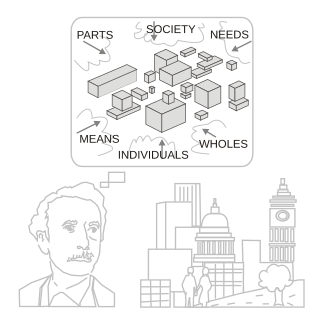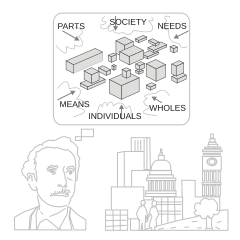Systems theory is the transdisciplinary study of systems, i.e. cohesive groups of interrelated, interdependent components that can be natural or artificial. Every system has causal boundaries, is influenced by its context, defined by its structure, function and role, and expressed through its relations with other systems. A system is "more than the sum of its parts" by expressing synergy or emergent behavior.

Systems science, also referred to as systems research, or, simply, systems, is a transdisciplinary field concerned with understanding systems—from simple to complex—in nature, society, cognition, engineering, technology and science itself. The field is diverse, spanning the formal, natural, social, and applied sciences.

Computational sociology is a branch of sociology that uses computationally intensive methods to analyze and model social phenomena. Using computer simulations, artificial intelligence, complex statistical methods, and analytic approaches like social network analysis, computational sociology develops and tests theories of complex social processes through bottom-up modeling of social interactions.
Biorobotics is an interdisciplinary science that combines the fields of biomedical engineering, cybernetics, and robotics to develop new technologies that integrate biology with mechanical systems to develop more efficient communication, alter genetic information, and create machines that imitate biological systems.
Charles François was a Belgian administrator, editor and scientist in the fields of cybernetics, systems theory and systems science, internationally known for his main work the International Encyclopedia of Systems and Cybernetics.
The International Federation for Systems Research(IFSR) is an international federation for global and local societies in the field of systems science. This federation is a non-profit, scientific and educational agency founded in 1980, and constituted of some thirty member organizations around the globe..
Mihajlo D. Mesarovic is a Serbian scientist, who is a professor of Systems Engineering and Mathematics at Case Western Reserve University. Mesarovic has been a pioneer in the field of systems theory, he was UNESCO Scientific Advisor on Global change and also a member of the Club of Rome.
Michael Christopher Jackson OBE is a British systems scientist, consultant and Emeritus Professor of Management Systems and former Dean of Hull University Business School, known for his work in the field of systems thinking and management.

Gerhard Chroust is an Austrian systems scientist, and Professor Emeritus for Systems Engineering and Automation at the Institute of System Sciences at the Johannes Kepler University Linz, Austria. Chroust is an authority in the fields of formal programming languages and interdisciplinary information management.
Peter Andrew Corning is an American biologist, consultant, and complex systems scientist, Director of the Institute for the Study of Complex Systems, in Seattle, Washington. He is known especially for his work on the causal role of synergy in evolution.

The American Society for Cybernetics (ASC) is an American non-profit scholastic organization for the advancement of cybernetics as a science, a discipline, a meta-discipline and the promotion of cybernetics as basis for an interdisciplinary discourse. The society does this by developing and applying cybernetics’ concepts which are presented and published via its conferences and peer-reviewed publications. As a meta-discipline, it creates bridges between disciplines, philosophies, sciences, and arts. The ASC is a full member of the International Federation for Systems Research (IFSR).

Cybernetics is a field of systems theory that studies circular causal systems whose outputs are also inputs, such as feedback systems. It is concerned with the general principles of circular causal processes, including in ecological, technological, biological, cognitive and social systems and also in the context of practical activities such as designing, learning, and managing.
The IEEE Systems, Man, and Cybernetics Society is a professional society of the IEEE. It aims "to serve the interests of its members and the community at large by promoting the theory, practice, and interdisciplinary aspects of systems science and engineering, human-machine systems, and cybernetics".

Kathleen M. Carley is an American computational social scientist specializing in dynamic network analysis. She is a professor in the School of Computer Science in the Carnegie Mellon Institute for Software Research at Carnegie Mellon University and also holds appointments in the Tepper School of Business, the Heinz College, the Department of Engineering and Public Policy, and the Department of Social and Decision Sciences.

Fei-Yue Wang is a specially appointed state expert, and the Chief Scientist and Founding Director of the State Key Laboratory for Management and Control of Complex Systems of the Chinese Academy of Sciences. He is editor-in-chief of the IEEE Transactions on Computational Social Systems and the IEEE/CAA Journal of Automatica Sinica. Previously he was a Professor of Systems and Industrial Engineering at the University of Arizona, president of the IEEE Intelligent Transportation Systems Society, editor-in-chief of IEEE Transactions on Intelligent Transportation Systems (2009–2016), and editor-in-chief of IEEE Intelligent Systems.

Jason Jixuan Hu, is a Chinese American cyberneticist, independent scholar and managing director of WINTOP Organizational Learning Laboratory, and organizer/facilitator of the Club of Remy(Youtube Channel). He is noted for his work on "cognitive capacity in human communication, conflict resolution and cooperation solicitation," and on view on distance education in America.
Mengchu Zhou is a Chinese-American Distinguished Professor of electrical and computer engineering in the Helen and John C. Hartmann Dept. of Electrical and Computer Engineering at New Jersey Institute of Technology (NJIT) and at Macau University of Science and Technology. He is the Chairman of IKAS Industries of Shenzhen in China and a Board Member of OneSmart Education Group headquartered in China.








